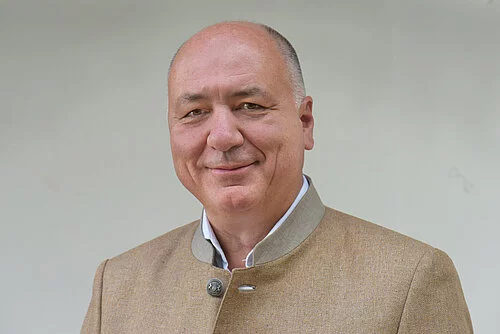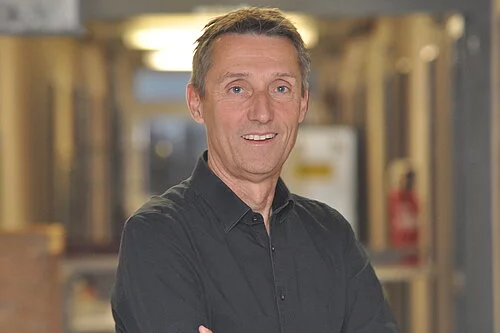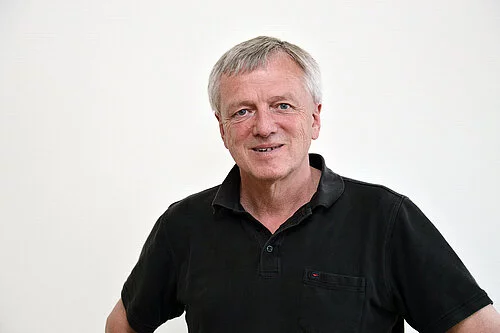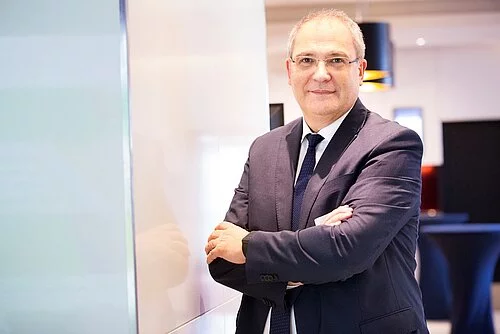Highly cited cluster members
Four Members of the Cluster of Excellence "Precision Medicine in Chronic Inflammation" (PMI) are among the "Highly Cited Researchers 2021" with their publications.
Once per year, the Web of Science Group at the American company, Clarivate Analytics, analyses the significance and impact of scientists based on their citation rates. Researchers whose work is cited especially frequently by specialist colleagues are considered particularly significant and influential in their field. The Highly Cited Researchers lists scientists who were involved in several of the top 1% of the most frequently cited papers in their field during the last decade. In 2021 there were 6,602 names on this list. These included four members of the Cluster of Excellence "Precision Medicine in Chronic Inflammation" (PMI): Stefan Schreiber, Axel Hauschild, Stefan Rose-John und Diamant Thaçi.

Highly Cited Researcher in the category “Cross Field”: Prof. Dr Stefan Schreiber is the spokesperson for the Cluster of Excellence Precision Medicine in Chronic Inflammation (PMI), Director of the Institute of Clinical Molecular Biology at the CAU and UKSH, and Director of the Department of Internal Medicine I at the UKSH, Campus Kiel.

Highly Cited Researcher in the category “Clinicial Medicine”: Prof. Dr Axel Hauschild, member of the Cluster of Excellence PMI, is a senior physician and head of the Dermatological Oncology working group at the Department of Dermatology, Venerology and Allergology, UKSH, Campus Kiel.
Stefan Schreiber
Innovative Approaches for Chronic Inflammatory Diseases
Professor Stefan Schreiber has been on the list of Highly Cited Researchers for eight years in a row since 2014, often even in two categories. Schreiber has focused his research for many years on the mechanisms of inflammation and the development of new treatments for chronic inflammatory diseases. Building on new molecular findings, he researches innovative approaches to prevent and treat these illnesses. On Schreiber’s initiative, the Inflammation at Interfaces network was formed in 2004, which was funded through the German Excellence Initiative from 2007 to 2018 and has been continued since 2019 as the Cluster of Excellence Precision Medicine in Chronic Inflammation (PMI). With the goal of treating inflammation holistically instead of focusing on a certain organ, Schreiber developed the idea of an interdisciplinary inflammation clinic. Patients have been treated according to this approach at the Comprehensive Center for Inflammation Medicine at the UKSH, Campus Kiel, since 2009. “We are developing new therapies to be more successful at treating chronic diseases. We therefore need to research intensively in order to improve," emphasises Schreiber, who is currently involved in a study researching the long term effects of a COVID-19 infection. In 2005 Schreiber received the City of Kiel’s Science Prize; in 2020 he received the renowned Research Prize from the United European Gastroenterology Foundation (UEGF) umbrella organisation to develop new treatments for people with chronic inflammatory bowel diseases based on molecular nutritional intervention.
As a leading principle investigator, he has monitored over 80 clinical trials in the field of the chronic inflammatory bowel diseases ulcerative colitis and Crohn's disease, and was the lead investigator in over 50 of these. He is a member of numerous professional associations, has chaired multiple national and international conferences, is the co-editor of international journals and the author or co-author of more than 950 publications in scientific journals.
Axel Hauschild
Therapeutic Advances in Malignant Melanoma
Since his time as an assistant physician over 30 years ago in the Department of Dermatology, Venerology and Allergology, UKSH, Campus Kiel, Professor Axel Hauschild has been interested in skin cancer, particularly in extremely aggressive malignant melanomas. Over the past few years, the introduction of new medications has been able to significantly improve treatment in advanced stages of this disease. “The 5-year survival rate, which is used as a measure for prognosis, was just 5 percent in 2010 for advanced melanoma, and is now at 52 percent. No other type of tumour has made this kind of progress up to now,” emphasises Hauschild, who played a major role in this success. Hauschild was the lead investigator on over 120 clinical studies on various types of skin cancer, has been invited to more than 700 conferences around the world and has published upwards of 400 articles in scientific journals.
In recognition of his clinical and scientific achievements for skin cancer treatment, Hauschild received the German Skin Cancer Prize in 2003 and the German Cancer Prize in 2011 from the German Cancer Society. He is on the board of the European Association of Dermato-Oncology and the Melanoma World Society, was the president of the German Cancer Congress twice and in 2021 he was president of the World Congress of Melanoma for the second time, where he was elected president of the Melanoma World Society (MWS). The MWS is the successor society to the WHO Melanoma Group. It aims to coordinate research activities and improve the treatment of people suffering with skin cancer around the world.
![[Translate to English:] Porträtfoto](/fileadmin/_processed_/2/b/csm_stefan-rose-john_ad29e4a657.jpg.webp)
Highly Cited Researcher in the category “Cross Field”: Prof. Dr Stefan Rose-John, member of the Cluster of Excellence PMI, Director of the Institute of Biochemistry at the CAU and head of the Collaborative Research Centre (CRC) 877 "Proteolysis as a Regulatory Event in Pathophysiology".

„Highly Cited Researcher“ in the category „Cross Field“: Prof. Dr. Diamant Thaçi member of the Cluster of Excellence PMI, Direkcor of the Institute for Inflammation Medicine and Head of the Section for Inflammation Medicine at the Department of Dermatology, Allergology and Venerology, UKSH, Campus Lübeck.
Stefan Rose-John
Regulating Inflammatory Processes
Professor Stefan Rose-John is an internationally sought-after expert on the cytokine Interleukin-6 (IL-6). The biochemist identified the crucial importance of this messenger substance in inflammatory processes over 20 years ago and has since been systematically researching its structure and mechanism. In 2001 he published the spatial structure with which IL-6 binds to one of its receptors in the renowned scientific journal Science and thereby laid the foundations for further research. He also verified that Interleukin-6 works via two signalling pathways. The pivotal trigger for chronic inflammation is the trans-signalling pathway he discovered, which involves the binding of an IL-6 receptor that is soluble in blood and tissue and can stimulate all cells in the human body, while processes of cell regeneration and the normal protective immune response are regulated via the classic signalling pathway. This discovery enabled the targeted inhibition of only those signals from Interleukin-6 which promote inflammation.
Rose-John developed the designer protein sgp130Fc, which specifically blocks the Interleukin-6 trans-signalling pathway and thereby inhibits inflammation. This is the first time ever that it has been possible to inhibit the inflammatory activity of a cytokine like Interleukin-6 without compromising its protective and regenerative effects. Under the name of Olamkicept, the protein has already been tested in phase 2 clinical trials at the UKSH under the leadership of Professor Stefan Schreiber and in one additional study in China on people with chronic inflammatory bowel diseases with extremely positive results. A phase 3 clinical trial is currently being prepared, which is the prerequisite for the approval of Olamkicept as a pharmaceutical product.
“What distinguishes my working group and makes us extremely valuable partners for many labs around the world is that we have the best molecular tools to investigate the signalling pathways of IL-6,” emphasises Rose-John, who has headed the Collaborative Research Centre (CRC) 877 "Proteolysis as a Regulatory Event in Pathophysiology" since 2010.
Rose-John is an elected member of the Academy of Sciences and Humanities in Hamburg and in 2005 he was awarded the City of Kiel’s Science Prize, as well as the Jacob-Henle Medal from the University of Göttingen in 2019.
Diamant Thaçi
New Therapies for Inflammatory Skin Diseases
Professor Diamant Thaçi has headed the Inflammation Medicine Excellence Center of UKSH, Lübeck Campus since 2013, is Director of the Institute for Inflammation Medicine and heads the Inflammation Medicine Section at the Clinic for Dermatology, Venereology and Allergology of UKSH, Lübeck Campus. The outpatient clinic and research unit was established at both UKSH locations in order to transfer patients with serious chronic inflammatory diseases to interdisciplinary treatment as efficiently and quickly as possible. "Close cooperation between different disciplines enables optimal innovative care for patients. The integration of basic research and clinical practice in a center of excellence is unique and forward-looking," emphasizes the dermatologist. Thaçi's research focuses on chronic inflammatory skin diseases such as psoriasis, atopic dermatitis (neurodermatitis) and autoimmune skin diseases. In psoriasis in particular, significant progress has been made with new therapies. About ten years ago, the therapeutic goal was a 50 percent improvement in psoriasis, which is one of the most common diseases in dermatology. After the introduction of new targeted therapies, the treatment goal was also raised to 75 percent improvement. "Today, with new drugs, we expect at least 90 percent improvement in skin symptoms," explains Thaçi, who has played a major role in this success. He did research in all phases of clinical drug development, participated as an principal investigator in numerous scientific studies, and headed more than 500 national and international multicenter studies.
For his patient-oriented clinical research Thaçi received 2005 the award of Theodor Stern Foundation. He has published more than 300 articles in scientific journals, is editor, co-editor and reviewer of several scientific journal. Thaci is also a member of the Steering Committee of the Group for Research and Assessment of Psoriasis and Psoriatic Arthritis (GRAPPA), the Skin Inflammation & Psoriasis International Network (SPIN) and active member of other scientific associations.
About „Highly Cited Researchers“
The list is based on analysis of the "Web of Science Core Collection" database. The database records scientific publications from around 21,000 specialist journals. The period from 2010 to 2020 was analysed for this year's list of Highly Cited Researchers. The ranking is an important indicator of the influence of scientific publications, which are among the top 1% of the most cited in their respective field. In 2021, the list featured 6,602 of the world's scientists from 21 research categories. This included 24 Nobel Prize winners. Two scientists from Kiel were recognised in the category “Cross Field”, which considers interdisciplinary work and the influence of the researchers in several fields over the past decade.
Further Links
Scientific contacts
Prof. Dr. Stefan Schreiber
Department of Internal Medicine I, UKSH
Institute of Clinical Molecular Biology, CAU Kiel, UKSH
+49 431/500-15101
s.schreiber@mucosa.de
Prof. Axel Hauschild
Department of Dermatology, Venerology and Allergology, UKSH
Dermatological Oncology working group
+49 431/500-21130
ahauschild@dermatology.uni-kiel.de
Prof. Stefan Rose-John
Executive Director of the Institute of Biochemistry
Kiel University (CAU)
+49 431/880-3336
rosejohn@biochem.uni-kiel.de
Prof. Dr. Diamant Thaçi
Institute for Inflammation Medicine
Comprehensive Center of Inflammation Medicine
+49 451/500-41620
diamant.thaci@uksh.de
Press contacts
Press, Communication and Marketing Services
Department for Press, Digital and Science Communication
+49 431/880-2104
presse@uv.uni-kiel.de
www.uni-kiel.de
Kerstin Nees
Press and Public Relations, Cluster of Excellence PMI
+49 431/880-4682
presse.cluster@uv.uni-kiel.de
https://precisionmedicine.de
Oliver Grieve
press officer
University Medical Center Schleswig-Holstein
(UKSH)
+49 173 4055 000
Oliver.Grieve@uksh.de
Zur Website





